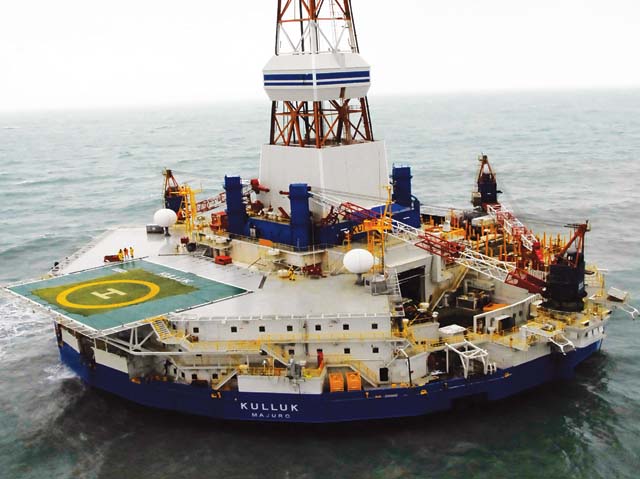A recently released U.S. Coast Guard report on the Kulluk grounding in the Gulf of Alaska in 2012 is an indictment of both preparations for the ill-fated tow and of actions and omissions of officers onboard the towing vessel, the Aiviq, a 360'×80', 22,000-hp tug/supply vessel built and operated by Louisiana-based Edison Chouest Offshore.
The report reveals that the Coast Guard is “conducting further investigation to determine appropriate enforcement action” against the Aiviq’s master, chief engineer and third mate for “acts of misconduct or negligence” including failure to report marine casualties, failure to report safety-related vessel issues and improper/illegal bridge and engine room watch-keeping.
Royal Dutch Shell, the owner of the Kulluk, a 266'-dia., conical-shaped mobile offshore drilling unit (MODU) that was being towed from Dutch Harbor, Alaska, to Seattle for off-season shipyard work, was also criticized in the report for failure to prepare an adequate towing plan for a winter transit across the Gulf of Alaska, among other things.
In a memorandum attached to the report, Rear Adm. T. P. Ostebo stated that a “complex series of events contributed to the error chain that resulted in the grounding” on Dec. 31, 2012, but “the most significant factor was the decision to attempt the voyage during the winter in the unique and challenging operating environment in Alaska.”
The report also supports the contention that the late December tow was undertaken by Shell to avoid state taxes that would be assessed if the Kulluk was still in Alaska at the beginning of 2013, a factor that Shell denied at the time.
During the tow, crew inexperience led to “ineffective action to reduce extremes in towline tensions” prior to the failure of a towing shackle, which itself was “undersized,” the Coast Guard report said.
The Aiviq also suffered failure of all four main engines during the incident, which is now being blamed on water contamination in the fuel. Furthermore, the investigation revealed that “the height and location of the fuel oil header/overflow vents exposed them to immersion in water, which is strongly suspected to have occurred on numerous occasions prior to the loss of the Aiviq’s engines.”
According to the report, the “master’s request to raise the tank vents prior to commencing the voyage to Edison Chouest management was not acted upon prior to departure.”
The chief engineer also recommended addressing fuel tank vent issues during the voyage and prior to the engine failures.
The reliance on a single vessel for the tow and improper contingency planning also contributed to the grounding, according to the report.
In addition to further investigation of the officers involved, the Coast Guard report recommends that the Towing Safety Advisory Council establish a working group to review and evaluate towage standards for MODUs in the Arctic marine environment.
— Bruce Buls





